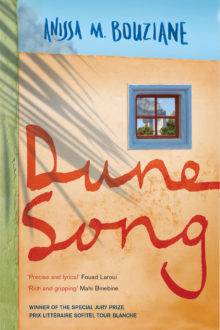Anissa M. Bouziane is American and the daughter of a Moroccan father and a French mother. In Dune Song, which is semi-autobiographical, she addresses the dichotomy of this East-meets-West identity. The protagonist of the novel, Jeehan Naathar, is a young American woman whose identity is shattered in the weeks and months following the collapse of the World Trade Centre towers on 9/11.
Jeehan is suddenly forced to choose between her identities – is she Muslim, or is she American? – as the people around her become convinced that she cannot be both. Plagued by the judgement that descends upon her from her friends and colleagues, she decides to return to her father’s homeland, Morocco, initiating an exploration of identity, the self, and her quest for salvation.
In alternating chapters, we observe both Jeehan’s present travels through Morocco and her time in America just after 9/11. These parallel plots bring out the stark contrast between Africa and America, their individual geography, climate, and culture. As she tries to navigate a largely unknown land, she meets kind strangers who almost adopt her as their own. In Bouziane’s poetic writing, the identity crises that many immigrants face is brought out. Even though Jeehan considers herself American, her hosts in Morocco see her just as a “frightened cat” who needs looking after.
Somewhere between looking for her past and resolving her relationship issues, Jeehan gets sucked into the problems of the family she is living with. The questions she faces will force her to recalibrate who she really is and question the “American dream”.
In bringing the two worlds together, this book adds its voice to related works by Khaled Hosseini and Jhumpa Lahiri. It tries to make sense of a dual or multi-directional identity in a world that increasingly attempts to force people to choose one over another.
